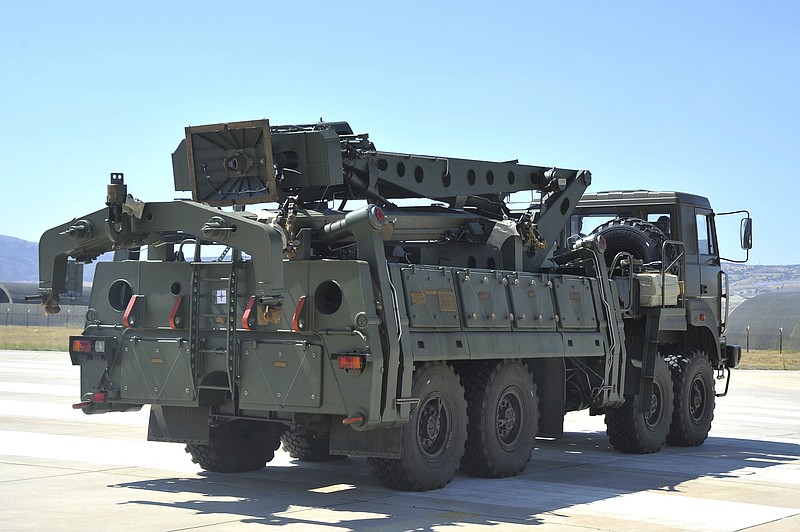ISTANBUL -- A Turkish defense official sanctioned by the United States said Tuesday that bilateral relations will not be affected despite the Trump administration's decision to punish Turkey for its purchase of a Russian air defense system, as senior officials continued to condemn the move.
Ismail Demir, the head of Turkey's military procurement agency, emphasized that Turkey and the U.S. are NATO allies and will continue working together. He also argued that the sanctions could serve as a "warning" for Turkey's local defense industries to continue and speed up their work.
"This is an occasion that should be assessed on its own terms, and I think we expect this to not affect relations much," Demir told journalists.
Turkey Foreign Minister Mevlut Cavusoglu spoke with U.S. Secretary of State Mike Pompeo on Tuesday and relayed Turkey's "reactions" on the sanctions, according to the Foreign Ministry.
Monday's sanctions are part of the Countering America's Adversaries Through Sanctions Act and are aimed at pushing back on Russian influence. The sanctions target Turkey's presidency of defense industries, Demir and three other senior officials. The penalties block any assets the four officials may have in U.S. jurisdictions and bar their entry into the U.S. They also include a ban on most export licenses, loans and credits to the agency.
The move marks the first time that the law has been used to penalize a U.S. ally.
Turkey's defense minister condemned the sanctions, saying the decision "has shaken all the values of our alliance."
"It is clear that the sanctioning of a NATO member will not only hurt the spirit of alliance but also shake trust among allies from its core," Hulusi Akar said, adding that Turkey had serious security concerns and will take all steps to protect its citizens.
Ankara has angered Washington by buying and testing the S-400 missile defense system. Turkey's government has insisted that it was not offered the U.S. Patriot systems and was forced to buy the Russian system instead for its national security.
The U.S. has kicked Turkey out of its F-35 stealth jet program, saying the fighter jets' use alongside the Russian technology would jeopardize their safety. The U.S. also says the Russian system would not be interoperable with NATO systems.
Turkey says there is no risk to NATO systems because they would not be integrated into defense strategies involving the S-400s, while pointing out that NATO member Greece also has Russian missiles.
In a rare show of unity, lawmakers from Turkish President Recep Tayyip Erdogan's ruling party and its nationalist allies, parliamentarians from the main opposition party and a smaller opposition group all said they reject the sanctions decision.
"Turkey does not hesitate to take any steps required for its national security. It's not a country to take a step back in the face of threats and sanctions," their joint statement read.
Demir tweeted on Monday, soon after the U.S. sanctions announcement, that any decision abroad against him or the presidency of defense industries would not change his position. "Nothing will be able to stop the Turkish defense industry," he said.
Erdogan, speaking ahead of the sanctions, said he was saddened by an increase in "sanctions discourse" from both the U.S. and Europe. Erdogan said he expects support from a NATO ally against terror organizations, rather than sanctions.
Turkey's Foreign Ministry and top government officials also condemned the move late Monday.
Fahrettin Altun, Turkey's communications director, called the sanctions "unreasonable, fruitless and ultimately incompatible with the spirit of our partnership." He tweeted that Turkish-American relations were more important and said he hopes the U.S. will reverse its decision.
Turkey took delivery of the S-400 missiles in the summer of 2019 and tested them for the first time in October.
Relations between the countries have suffered from numerous disputes, including the jailing of American citizens and local consular staff members, U.S. support for Syrian Kurdish fighters and the continued U.S. residence of a Muslim cleric accused of masterminding the 2016 coup attempt in Turkey.
